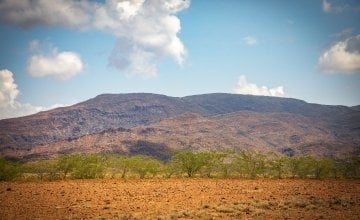
Knowledge Hub
Fighting hunger from the home: the ground-breaking project that’s combating malnutrition

The saying ‘the home is where the heart is’ may soon take on a whole new meaning in light of an innovative project being trialled by Concern, in partnership with the Innocent Foundation, which teaches mums how to screen for malnutrition and diagnose their children from their own homes.
The project
In northern Kenya, drought, flooding, conflict and an invasion of locusts has severely affected people’s access to food meaning that unacceptable numbers of children are dying from hunger. The pioneering ‘CeaSurge project’, also known as ‘Mama MUAC’, teaches mums and caregivers in areas of northern Kenya how to use a MUAC (mid-upper arm circumference) screening band - which is used to assess and diagnose malnutrition - so that they are able to monitor their children at home.
By training mums to screen and diagnose their children in this way, the hope is that it will encourage early detection, referrals and treatment of malnutrition, and ultimately reduce the number of deaths of children under the age of five.
The project is implemented in a number of stages:
- Firstly, 449 mothers were identified and trained in April 2019 on maternal and child nutrition and how to take a MUAC measurement. 60 Community Health Volunteers then took part in refresher training focusing on how to obtain MUAC readings, provide information on good nutrition for mums and children, and make referrals.
- Assessments were then conducted throughout the year to evaluate a mum’s knowledge and practices on child nutrition and the reliability of a mum’s screening, as well as trying to determine why some mothers were not screening, or not referring their children to the health centre. The reason for this was found to be gaps in knowledge.
- As a result, another refresher training was conducted in March 2020 targeting all 449 mothers initially trained on the approach.
Why northern Kenya?

North Horr, where the trial is taking place, has a population of around 85,000 people including 13,000 children under five. This area is home to a nomadic, pastoralist population that is facing recurring droughts that are increasing in frequency and severity, threatening their access to food as most rely on pastoralism to survive. These communities are now also facing an added threat – forage-eating locusts – that have left thousands without a means of income and livestock at risk of collapsing from starvation.
In 2018, North Horr had a Global Acute Malnutrition (GAM) rate for children under 5 of 23.5%, and of 25.1% in 2019. This alarming increase signals a critical nutrition situation, and is predicted to worsen in 2020 in light of the various external threats exacerbating limited access to food. Furthermore, screening and referral for malnutrition is inadequate in this area due to poor community-level services, weak referral pathways, and substandard healthcare.
How is the trial going?
The programme started on a high note with 449 women trained on MUAC measurement, interpretation and referral of their children. The approach was also widely accepted by mothers. Further, the assessments has shown that mothers are equally good as the community health workers in correctly taking the MUAC measurement. However, there have been some challenges. The prolonged drought in 2019 that led to severe food insecurity and water shortages meant that mothers spent much of their time looking for water and less time attending to their children. The desert locusts pose an additional challenge for communities, not only threatening their food security and livelihoods but also causing mass migration as those whose pasture and vegetation were destroyed by the locusts have travelled to other areas in search of pasture for livestock. This hindered the number of mothers reached during the refresher training as some mothers moved with their families to other locations.
Moreover, due to the rapidly changing situation of Covid-19 and for the health and safety of staff and beneficiaries and in line with government directives to keep social distancing, activities like surveys and assessments may have to be delayed if it is deemed not safe to continue as scheduled. We are monitoring the situation closely and are ensuring contingency plans are in place.
However, despite these challenges, already we are seeing the health system strengthened with improved engagement between the health system and community. And while we can’t say too much yet, what we can say is that this project may change the way we combat malnutrition forever.
The home may well be the heart of where the fight against hunger takes place.
The Innocent Foundation
Other ways to help
Donate now
Give a one-off, or a monthly, donation today.
Join an event
From mountain trekking to marathon running, join us for one of our many exciting outdoor events!
Buy a gift
With an extensive range of alternative gifts, we have something to suit everybody.
Leave a gift in your will
Leave the world a better place with a life-changing legacy.
Become a corporate supporter
We partner with a range of organisations that share our passion and the results have been fantastic.
Create your own fundraising event
Raise money for Concern by organising your own charity fundraising event.





